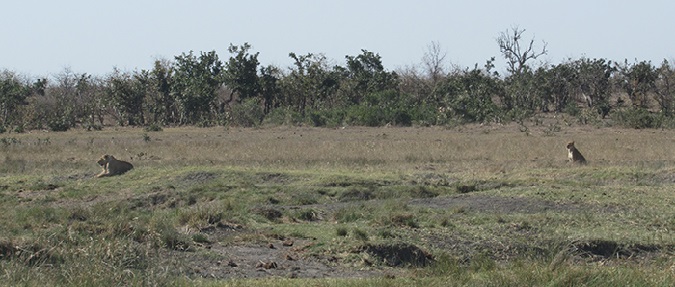For decades, hunting has been an important tool for U.S. wildlife managers, helping to protect and restore dozens of native wildlife populations from elk to ducks, mule deer to wild turkeys. American hunters make up the largest proportion of people who hunt overseas, placing our nation in a key role to support science-based, well-managed hunting programs abroad.

Last year, the Fish and Wildlife Service acted to protect all lions under the Endangered Species Act (ESA) while acknowledging that sport hunting could play a significant role in their conservation. The import of lion trophies taken in South Africa during permitted hunts from wild and wild-managed lion populations was approved. These are lions that roam in a limited number of national parks or on reserves designated by South Africa’s wildlife management authorities.
Today, we’re announcing the continuation of our previous approval. The import of trophies taken from South African wild and wild-managed lion populations supports a science-based conservation program. However, until additional information becomes available, the Service is unable to authorize the import of captive lion trophies from South Africa. These findings will remain in place through the 2019 hunting seasons unless information is received that causes us to reconsider.
Our nation has an obligation under the ESA to make sure U.S. hunters are contributing to the conservation of lions in the wild by participating in hunting programs that provide a clear conservation benefit and contribute to the long-term survival of the species in the wild. These decisions meet our obligation under the ESA while assisting in building and sustaining community support for lion conservation and helping combat poaching and illegal trade in South Africa.
The Service worked closely with South Africa’s Ministry of Environmental Affairs during the past year to gather and analyze information about management of both wild and captive populations. Based on the information provided, we’ve concluded that issuing an import permit for legally hunted lions from a wild or wild-managed population in South Africa would have positive benefits, both direct and indirect, on the long-term survival of the species.
South Africa’s hunting program focuses on taking only those lions that are old enough to have already successfully bred and raised several litters of cubs. This level of take is conservative and based on scientific recommendations of sustainable take of lions to ensure the continued presence of lions within South Africa.
In the case of lions taken from captive populations, that burden of proof has not been met. Captive-bred lions are managed for financial gain, with genetics and population demographics manipulated for this purpose. This could compromise genetic integrity and provenance and therefore make these lions not suitable for reintroduction purposes. The South African Ministry of Environmental Affairs has limited control over the management and harvest of these animals on private lands. We have yet to receive specific information about the hunting of captive lions in South Africa demonstrating a benefit from these activities to the long-term survival of the species in the wild.
We will continue working on multiple levels with our partners to protect lions and address the threats they face. This includes efforts to reduce livestock depredation and to prevent illegal killing of lions while supporting tourism and other economic activities involving wild and wild-managed lions. We’re also working with international law enforcement partners to investigate, arrest and prosecute poachers and traffickers.
We will keep engaging and working with our international counterparts to evaluate and assess sport-hunting programs. This will help ensure that American hunters continue to find opportunities to contribute to conservation and support local communities through legal, science-based, well-managed hunting programs, such as those currently in place for wild and wild-managed lions in South Africa.
